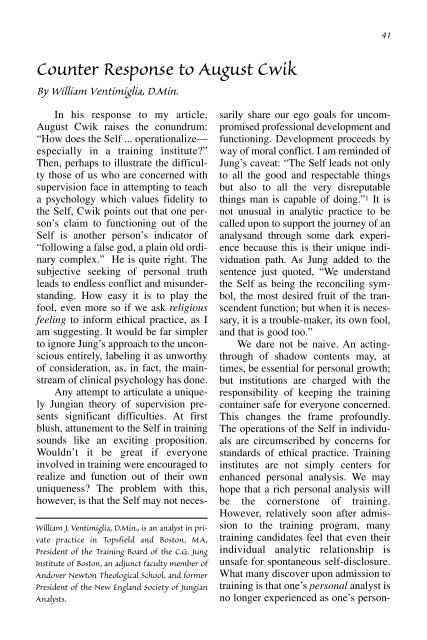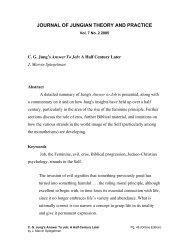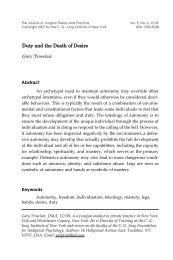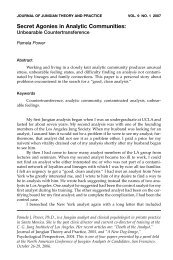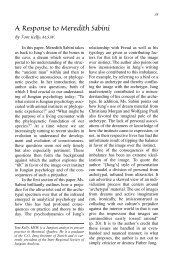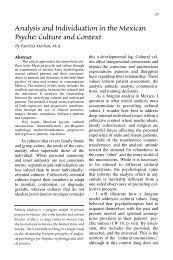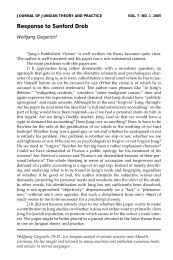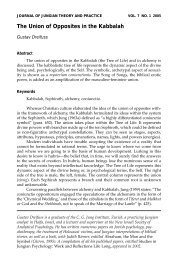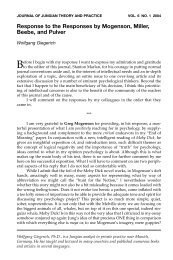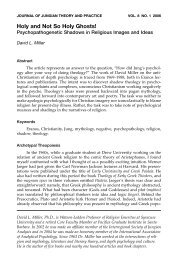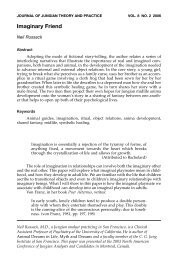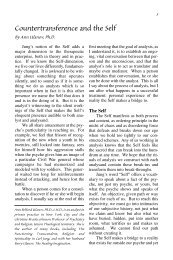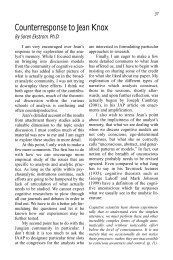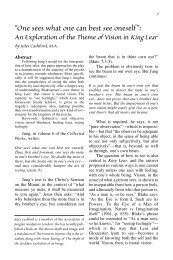Vent CtrRes2 Cwik p41-42 - CG Jung Institute of New York
Vent CtrRes2 Cwik p41-42 - CG Jung Institute of New York
Vent CtrRes2 Cwik p41-42 - CG Jung Institute of New York
You also want an ePaper? Increase the reach of your titles
YUMPU automatically turns print PDFs into web optimized ePapers that Google loves.
41<br />
Counter Response to August <strong>Cwik</strong><br />
By William <strong>Vent</strong>imiglia, D.Min.<br />
William J. <strong>Vent</strong>imiglia, D.Min., is an analyst in private<br />
practice in Topsfield and Boston, MA,<br />
President <strong>of</strong> the Training Board <strong>of</strong> the C.G. <strong>Jung</strong><br />
<strong>Institute</strong> <strong>of</strong> Boston, an adjunct faculty member <strong>of</strong><br />
Andover <strong>New</strong>ton Theological School, and former<br />
President <strong>of</strong> the <strong>New</strong> England Society <strong>of</strong> <strong>Jung</strong>ian<br />
Analysts.<br />
In his response to my article,<br />
August <strong>Cwik</strong> raises the conundrum:<br />
“How does the Self ... operationalize—<br />
especially in a training institute”<br />
Then, perhaps to illustrate the difficulty<br />
those <strong>of</strong> us who are concerned with<br />
supervision face in attempting to teach<br />
a psychology which values fidelity to<br />
the Self, <strong>Cwik</strong> points out that one person’s<br />
claim to functioning out <strong>of</strong> the<br />
Self is another person’s indicator <strong>of</strong><br />
“following a false god, a plain old ordinary<br />
complex.” He is quite right. The<br />
subjective seeking <strong>of</strong> personal truth<br />
leads to endless conflict and misunderstanding.<br />
How easy it is to play the<br />
fool, even more so if we ask religious<br />
feeling to inform ethical practice, as I<br />
am suggesting. It would be far simpler<br />
to ignore <strong>Jung</strong>’s approach to the unconscious<br />
entirely, labeling it as unworthy<br />
<strong>of</strong> consideration, as, in fact, the mainstream<br />
<strong>of</strong> clinical psychology has done.<br />
Any attempt to articulate a uniquely<br />
<strong>Jung</strong>ian theory <strong>of</strong> supervision presents<br />
significant difficulties. At first<br />
blush, attunement to the Self in training<br />
sounds like an exciting proposition.<br />
Wouldn’t it be great if everyone<br />
involved in training were encouraged to<br />
realize and function out <strong>of</strong> their own<br />
uniqueness The problem with this,<br />
however, is that the Self may not necessarily<br />
share our ego goals for uncompromised<br />
pr<strong>of</strong>essional development and<br />
functioning. Development proceeds by<br />
way <strong>of</strong> moral conflict. I am reminded <strong>of</strong><br />
<strong>Jung</strong>’s caveat: “The Self leads not only<br />
to all the good and respectable things<br />
but also to all the very disreputable<br />
things man is capable <strong>of</strong> doing.” 1 It is<br />
not unusual in analytic practice to be<br />
called upon to support the journey <strong>of</strong> an<br />
analysand through some dark experience<br />
because this is their unique individuation<br />
path. As <strong>Jung</strong> added to the<br />
sentence just quoted, “We understand<br />
the Self as being the reconciling symbol,<br />
the most desired fruit <strong>of</strong> the transcendent<br />
function; but when it is necessary,<br />
it is a trouble-maker, its own fool,<br />
and that is good too.”<br />
We dare not be naive. An actingthrough<br />
<strong>of</strong> shadow contents may, at<br />
times, be essential for personal growth;<br />
but institutions are charged with the<br />
responsibility <strong>of</strong> keeping the training<br />
container safe for everyone concerned.<br />
This changes the frame pr<strong>of</strong>oundly.<br />
The operations <strong>of</strong> the Self in individuals<br />
are circumscribed by concerns for<br />
standards <strong>of</strong> ethical practice. Training<br />
institutes are not simply centers for<br />
enhanced personal analysis. We may<br />
hope that a rich personal analysis will<br />
be the cornerstone <strong>of</strong> training.<br />
However, relatively soon after admission<br />
to the training program, many<br />
training candidates feel that even their<br />
individual analytic relationship is<br />
unsafe for spontaneous self-disclosure.<br />
What many discover upon admission to<br />
training is that one’s personal analyst is<br />
no longer experienced as one’s person-
<strong>42</strong> / <strong>Vent</strong>imiglia<br />
al analyst. It becomes clear that he or<br />
she also belongs to a network <strong>of</strong> colleagues<br />
focused not only on therapy<br />
and teaching but also on evaluation.<br />
Probably there will be political factions<br />
competing for dominance. It then<br />
becomes apparent to the initiate that<br />
<strong>Jung</strong>ian training lacks theoretical<br />
homogeneity. It may come as a shock<br />
to learn that “elders” don’t speak with a<br />
common language; nor do they come<br />
from a common experience <strong>of</strong> the<br />
unconscious. To make matters worse, a<br />
training analyst, supervisor, or evaluator<br />
may be more committed to their<br />
own narcissistic mirroring than they are<br />
to encouraging an emergence <strong>of</strong> the<br />
candidate’s true self and corresponding<br />
style in doing analysis. Moreover, as<br />
soon as candidates begin seeing<br />
patients under supervision then their<br />
personal analysis inevitably takes second<br />
place to learning the art <strong>of</strong> doing<br />
therapy. Therapeutic regressions are<br />
less likely to occur. Libido is now<br />
increasingly dedicated to pr<strong>of</strong>essional<br />
skill development.<br />
What does all this imply for “operationalizing”<br />
the Self in training institutes<br />
And what do I mean by suggesting<br />
that religious feeling inform the ethical<br />
practice <strong>of</strong> supervision It means<br />
teaching the symbolic method <strong>of</strong><br />
approaching the manifestations <strong>of</strong> the<br />
unconscious. It means teaching <strong>Jung</strong>’s<br />
notion <strong>of</strong> the autonomy and reality <strong>of</strong><br />
the psyche alongside more recent contributions<br />
from psychoanalytic traditions.<br />
As Lionel Corbett has stated, it means<br />
teaching “all <strong>of</strong> the manifestations <strong>of</strong> the<br />
Self so that they can be recognized for<br />
what they are. Numinosity is the obvious<br />
criterion, but may not be recognized<br />
for what it is.” 2 It means teaching that<br />
the analyst can do very little to operationalize<br />
the Self in another human<br />
being but we can create an optimum<br />
environment for the Self to make its<br />
presence and “intent” known. This<br />
means cultivating an attitude <strong>of</strong> respectful<br />
listening and watching. It means<br />
teaching that a therapeutic space is<br />
today, just as it always has been, a<br />
sacred space. As Mircea Eliade states,<br />
“The first possible definition <strong>of</strong> the<br />
sacred is that it is the opposite <strong>of</strong> the pr<strong>of</strong>ane.”<br />
And “Man becomes aware <strong>of</strong> the<br />
sacred because it manifests itself, shows<br />
itself, as something wholly different<br />
from the pr<strong>of</strong>ane.” 3 Thus, “the sacred is<br />
equivalent to a power, and, in the last<br />
analysis, to reality. The sacred is saturated<br />
with being.” 4 This is the attitude <strong>of</strong><br />
the circumcised heart, which does not<br />
take the place <strong>of</strong> pr<strong>of</strong>essional accountability<br />
but deepens it with the conviction<br />
that supervision, like analysis, serves a<br />
value that commands our deepest loyalty<br />
and respect. Accountability to the Self<br />
does not mean doing what we like<br />
because we feel compelled to do it. It<br />
has much more to do with doing what<br />
we must as we reverence another person’s<br />
highest value.<br />
Notes<br />
1. C. G. <strong>Jung</strong>, The Visions Seminars, bk. 2<br />
(Zurich: Spring, 1976), p. 472.<br />
2. Lionel Corbett, “Supervision and the<br />
Mentor Archetype,” in <strong>Jung</strong>ian Perspectives<br />
on Clinical Supervision, ed. Paul Kugler<br />
(Einsiedeln: Daimon, 1995), p. 75.<br />
3. Mircea Eliade, The Sacred and the Pr<strong>of</strong>ane<br />
(<strong>New</strong> <strong>York</strong>: Harcourt, Brace & World,<br />
1959), pp. 10-11.<br />
4. Ibid., p. 12.


